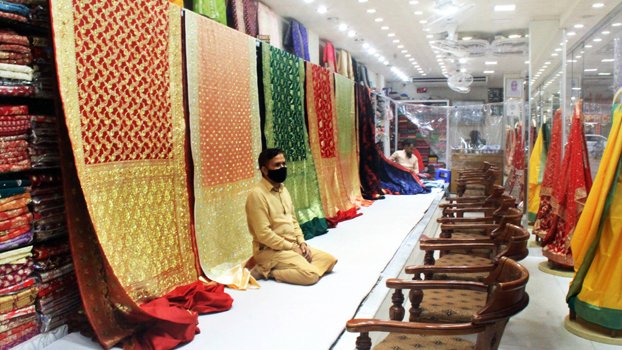Covid pandemic hits hard business in Benarasi Palli


Almost all businesses and institutions have started to recuperate from the shake of Coronavirus pandemic. However, the clothing business, especially Sari, of Benarsi Palli at Mirpur 10 and 11, has not yet got its previous vibe.
Even though the shops are open from morning till night, the buyers do not gather as expected by the traders. Daily sales have come down to several times lower than ever before. Being helpless to this circumstance, the owners are anxious of paying the salary of the employees, shop rent and other expenses.
And even, a few are thinking of saying goodbye to the business. Desi and Indian Benarsi sarees, lehengas, jamdani, cotton sarees, katan sarees and other ready-made garments are being showcased at various events, but they are rarely brought down and unfurled.
The restrictions imposed due to the lockdown to curb the Covid-19 transmission have made the wedding and other festivals compressed. This is why, they sale rate has got down this much, the shoppers say.
They say that even if one or two sarees are sold a day, that’s not even enough to pay the shop rent, salary and allowance of the artisans, let alone earning profit!
Mohammad Shakil, manager of Rimjhim Sari House, told Bangladesh Post, "Our business was consistent before the pandemic. The sale was worth at least Tk 25,000 per day. In times of occasion like Eid and Puja, the average sale a day would rise up to Taka 5-10 lakh.”
“And now, sometimes I don't even sell a single cloth for two or three days in a row. The owner even has to take loan sometimes, to pay the shop rent and regular expenses", he added unhappily.
He further said that the owner of the shop has to count the reverse loss as the business investment has decreased for the last 6 months. In this situation, he is thinking of closing down the business.
There are about 150 to 200 shops at the region of Mirpur, on which depend the livelihoods of hundreds of employees and owners as well as employment of thousands of artisans. Many of the artisans have already switched their profession, as the owners are unable to pay their wages without the regular sale and profit.
Md Sabuj, an employee of Subra Fashion Ltd, told Bangladesh Post, "Many looms have already closed as the sale of handmade shares have reduced drastically. They got involved in various occupations, including rickshaw pulling and day laboring."
Md. Jahangir Alam, a former artisan, now works as a laborer in a private company. He told Bangladesh Post, "I worked in a loom where I used to put ’Puthi’ and stone on sarees. The income was not that bad, even quite good at the festive periods. But in the last two years I had nothing to do but trying out my luck. The owner can't pay if he can't sell. Now I work as a labor on transporting goods."
The hand weaving and lace work that feature sarees of Mirpur Benarsi Palli are appreciated not only in Bangladesh but all over the world. The relationship of women with sari in festivals and joy has been there since ancient times.
During the Eid season, the appeal of sari even gets higher. Every year, local customers as well as foreign customers flock to Benarsi Palli in Mirpur. Many expatriate Bangladeshis also collect sari, lehenga and other garments through their relatives.
Traders and artisans thought that if they could capture the Eid market in recent times, they would be able to make up for the loss. However, due to restrictions for virus transmission and lack of public transport, the Benarsi shops in Mirpur have not become highlighted. Many people are getting married at home as there are restrictions on organizing wedding ceremonies. So, the rush to buy a pile of clothes ahead of weddings is much less now.
Traders also say that although the government announced stimulus packages for many sectors to offset these losses, they have not received any incentives.
On the contrary, even during this recession, they have to pay 7.5% VAT. Though a few of the traders have started selling online through different platforms, the sale is still not worth mentioning.
Despite these obstacles, some businessmen are seeing the light of hope. They say that if the rate of transmission is reduced, there will be permission to hold events in different places, as well as if there is permission to open markets or shops in full swing, then the business will see a flow again.


